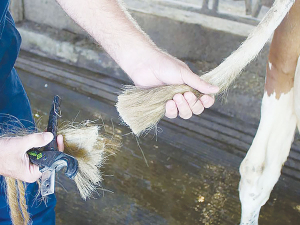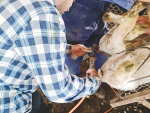Keep tail hair trimmed to prevent tails getting caught in equipment and to prevent the build-up of muck which can lead to tail injuries. Switches can be trimmed using hand shears, scissors, or electric trimmers.
Avoid using tail tape as an identification tool; if the tape gets dirty and left on it can lead to tail damage.
Many farmers get their vet to do an annual tail audit to monitor tail damage.
It's important to track changes and identify how and why any new tail damage occurs. Farm teams are the best group to identify where the challenges are to find solutions.
Annual tail audits are the most valuable once heifers enter the herd or after changes in the farm team, to create a benchmark to identify any handling issues. Having accurate records also allows you to track whether tail damage occurs on-farm or at off-farm grazing.
Check that your vet uses the national tail scoring standard. This will ensure scoring and reporting consistency so that you can compare your herd's results year on year, regardless of where you farm or what vet you use.
It's important to record damaged tails once a year so you know if new injuries are happening. If you don't record and benchmark, how can you know you have a problem or work to fix it?
Reporting a potential tail breaking concern within your farm business can seem like a confronting step, but it shows you care about your animals, it protects your reputation, and it's the right thing to do.
If you suspect you have an issue with tail breaking on farm, call MPI at 0800 00 83 33. An Animal Welfare Inspector will work with you to set up a tail assesment meeting during milking. They will let you know if there's anything you need to prepare before the visit. Records such as tail audits and stock handling policies and trainings may be useful.
Investigations are carried out on a case by case basis. MPI may talk to everyone on your farm team. It's important that MPI can get as much information as possible to make informed decisions to protect your animals.
If you would like to talk to a member of the DairyNZ Animal Care Team for a confidential chat about your situation, you can find your local animal care extension specialist here.
Tail breaking is a breach of the Animal Welfare Act and likely constitutes serious misconduct.
Follow the Rules
Regulations require any shortening of damaged tails to be carried by a vet and pain relief given.
If you see a damaged tail that needs shortening:
- Draft the cow out
- Call your vet
- Record the injury
- Discuss after care and pain relief with your vet
- Review the cause to prevent damage to other tails.
More: https://www.dairynz.co.nz/milking/dairy-stockmanship/tail-management/



















